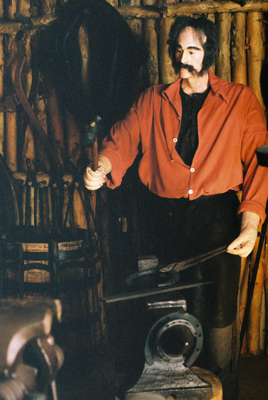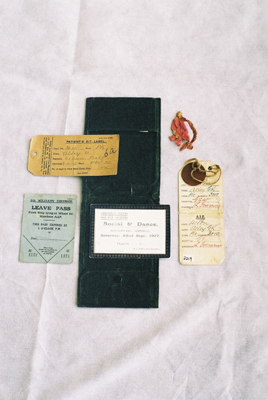Gordonvale
Mulgrave Settlers Museum
The Mulgrave Settlers Museum is a "living" museum with displays and dioramas depicting scenes and the way of life from earlier times. These include a blacksmith's shop, and old store, circa 1888, timber cutters, a miner panning for gold, a turn of the century kitchen and an Aboriginal display. Also features a Chinese display including a figure of Joss, as the Chinese played a prominent part in the history of Gordonvale by clearing land, starting market gardens and many other shops.
Address:
60 Gordon Street, Gordonvale, QLD
Tel:
0740561810
Hours:
10.00am-2.00pm Monday-Saturday. Closed Public Holidays and December to February.
Email:
Admission:
Adults $3.00, Pensioners and Students $2, Children $2, School groups $1 per child.
Facilities:
Wheelchair access, toilets, refreshments, guided tours by appointment, museum shop
Collection:
Collection depicts the history of the Mulgrave Shire Area including a large photographic collection and social history artefacts. Local archive records and maps.
Items
Blacksmith's Shop
Blacksmith's Shop

Description:
The Museum has a complete set of tools (41 items) which were used in a local blacksmith's shop in the first half of the 20th c. In 1898 William Harris was asked to come to Nelson (until 1913 Gordonvale was known under that name), to work as the head blacksmith for the Sugar Mill. In 1908 he opened his own blacksmith's shop in Gordon St, which in 1913 was moved to Norman St. It remained there until its closure in 1977.
Initially, the major task of the smith was the production and repair of farm tools, cartwheels as well as horseshoes. He also built cane planters, some of which were exported to South Africa and Fiji. From 1923 onwards, as cars and tractors started to replace horses, the workshop commenced conducting motor engineering and repair services for cars as well as the sale of fuel and oil.
All of the tools were produced in this shop and were in use until 1977 when the family business, which served the town for 69 years, has finally closed down. Bob Harris, a grandson of William Harris, donated the collection to Mulgrave Settlers Museum.
Statement of significance:
At the turn of 19/20th c. the services of the blacksmith's shops were indispensable for small Australian towns such as Gordonvale. The collection represents a full range of tools used in a typical blacksmith's shop from the first half of 20th century and its provenance is well documented. The tools are a good illustration of one of the major collecting objectives of Mulgrave Settlers Museum, which is to document local professions and occupations which have disappeared over time.
Initially, the major task of the smith was the production and repair of farm tools, cartwheels as well as horseshoes. He also built cane planters, some of which were exported to South Africa and Fiji. From 1923 onwards, as cars and tractors started to replace horses, the workshop commenced conducting motor engineering and repair services for cars as well as the sale of fuel and oil.
All of the tools were produced in this shop and were in use until 1977 when the family business, which served the town for 69 years, has finally closed down. Bob Harris, a grandson of William Harris, donated the collection to Mulgrave Settlers Museum.
Statement of significance:
At the turn of 19/20th c. the services of the blacksmith's shops were indispensable for small Australian towns such as Gordonvale. The collection represents a full range of tools used in a typical blacksmith's shop from the first half of 20th century and its provenance is well documented. The tools are a good illustration of one of the major collecting objectives of Mulgrave Settlers Museum, which is to document local professions and occupations which have disappeared over time.
Wallet
Soldier's Wallet - WWI

Description:
George Kenneth Alley (1899-1994), resident of Gordonvale, was one of thousands of young Australians who, in 1915, enlisted in the army to fight in the First World War.
He was a young man of 16, seeking adventure, and thought he would find it by putting up his age and joining the Army. Instead, he was faced with the terrible reality of war.
He spent almost three years in the trenches of Belgium and France, fighting amongst other places at Yprès, and was wounded in 1918 at Sailly-le-Sec on the Somme. In 1919 he returned home and became a sugar cane farmer. In later years, he was the Director of the Mulgrave Mill (1937-63) and a long-term Chairman of the Mulgrave Shire Council.
George Kenneth Alley's wallet is the type which, on joining the Army, the YMCA (Young Men's Christian Association) gave to all soldiers. He received this one in 1916, before departing for the battlefields of Europe. On the front of the wallet is the YMCA emblem superimposed over a map of Australia and the badge of the Rising Sun. On the back is the statement: Talk Clean, Live Clean, Fight Clean, Play the Game.
The wallet contains several items of personal significance to G.K. Alley:
The remains of a streamer which was thrown from the ship to the wharf when departing Cairns for the war in Europe
Ticket for a Social and Dance at Shanahan's Hall in Gordonvale, the proceeds of which were used towards sending Christmas Cheer parcels for soldiers on active service abroad. The name of the soldier and the name of the donor were written on the back of the ticket and included in the parcel
A couple of Leave Passes
Cards given to G.K. Alley when, after being wounded in France, he was admitted to Graylingswell War Hospital at Chichester, England
Identification disk, worn by the owner at all times
Ticket for return travel to Australia
G.K. Alley carried the wallet at all times, even in the trenches in France and Belgium. In 1992 he donated this precious personal memento to Mulgrave Settlers Museum in Gordonvale.
Significance:
The wallet and its content are important evidence of the close links and moral support which the local community provided their young soldiers fighting overseas. Among the servicemen from the small town of Gordonvale who fought in the First World War, 30 were killed and many more were wounded.
He was a young man of 16, seeking adventure, and thought he would find it by putting up his age and joining the Army. Instead, he was faced with the terrible reality of war.
He spent almost three years in the trenches of Belgium and France, fighting amongst other places at Yprès, and was wounded in 1918 at Sailly-le-Sec on the Somme. In 1919 he returned home and became a sugar cane farmer. In later years, he was the Director of the Mulgrave Mill (1937-63) and a long-term Chairman of the Mulgrave Shire Council.
George Kenneth Alley's wallet is the type which, on joining the Army, the YMCA (Young Men's Christian Association) gave to all soldiers. He received this one in 1916, before departing for the battlefields of Europe. On the front of the wallet is the YMCA emblem superimposed over a map of Australia and the badge of the Rising Sun. On the back is the statement: Talk Clean, Live Clean, Fight Clean, Play the Game.
The wallet contains several items of personal significance to G.K. Alley:
The remains of a streamer which was thrown from the ship to the wharf when departing Cairns for the war in Europe
Ticket for a Social and Dance at Shanahan's Hall in Gordonvale, the proceeds of which were used towards sending Christmas Cheer parcels for soldiers on active service abroad. The name of the soldier and the name of the donor were written on the back of the ticket and included in the parcel
A couple of Leave Passes
Cards given to G.K. Alley when, after being wounded in France, he was admitted to Graylingswell War Hospital at Chichester, England
Identification disk, worn by the owner at all times
Ticket for return travel to Australia
G.K. Alley carried the wallet at all times, even in the trenches in France and Belgium. In 1992 he donated this precious personal memento to Mulgrave Settlers Museum in Gordonvale.
Significance:
The wallet and its content are important evidence of the close links and moral support which the local community provided their young soldiers fighting overseas. Among the servicemen from the small town of Gordonvale who fought in the First World War, 30 were killed and many more were wounded.
Gordonvale, Belgium, France, Cairns, Sailly-le-Sec, Somme, Yprès
Photograph
The circus comes to town !
Description:
This is not Africa, but Gordonvale, a small town in Far North Queensland! Each year around July, Gordonvale looked forward to the annual visit of the circus. The companies, which most frequently visited the town, were Bullens, Worths, and sometimes also Ashtons. The circus animals were transported around Queensland by train and the circus started to visit the town from 1924, once the rail line connecting Brisbane and Cairns was completed. In Gordonvale, the Mulgrave Sugar Mill used to set aside part of its rail line for the circus carriages. The circus stayed in Gordonvale only 2-3 days, before moving to the next town. The performances were given initially in Norman Park but from the1950s onwards in Alley Park.
Elephants were one of the major attractions of the circus and when in Gordonvale they used to be taken down to the Mulgrave River for a wash and to cool off. In the background is Walsh's Pyramid (922 meters high), a typical landscape feature of Mulgrave Shire. Gordonvale children used to flock down to the circus grounds in hopes that they might be allowed to feed the animals. Those who were successful were given a free pass to the circus.
Significance statement:
The visit of the circus was a welcome attraction and an important annual event, especially until the 1950s, as few people had the means to travel to Cairns and local entertainment was limited to one cinema only. This photograph was taken in 1939 by visitors from England, when staying with their relatives in Gordonvale. In 2002 the album with 1939 holiday images was donated to the Mulgrave Settlers Museum.
The Museum has an extensive collection of almost 1000 historic photographs, which document various aspects of the life of Mulgrave Shire residents.
Elephants were one of the major attractions of the circus and when in Gordonvale they used to be taken down to the Mulgrave River for a wash and to cool off. In the background is Walsh's Pyramid (922 meters high), a typical landscape feature of Mulgrave Shire. Gordonvale children used to flock down to the circus grounds in hopes that they might be allowed to feed the animals. Those who were successful were given a free pass to the circus.
Significance statement:
The visit of the circus was a welcome attraction and an important annual event, especially until the 1950s, as few people had the means to travel to Cairns and local entertainment was limited to one cinema only. This photograph was taken in 1939 by visitors from England, when staying with their relatives in Gordonvale. In 2002 the album with 1939 holiday images was donated to the Mulgrave Settlers Museum.
The Museum has an extensive collection of almost 1000 historic photographs, which document various aspects of the life of Mulgrave Shire residents.
Queensland, Brisbane, Cairns, Gordonvale
